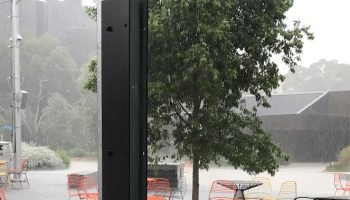** Since publication, through ministerial intervention Dr Banik and his family have been granted permanent residency. **
Dr Biswajit “Biswa” Banik, a lecturer in the Faculty of Medicine, Nursing and Health Sciences at Monash University for over five years has been confronted with the prospect of deportation by the Australian Government. Why? Because his twelve year old son, Arkojeet, is autistic. The Immigration Department reasons that he may be a burden upon the Australian economy and health services. It is on this basis that the family’s application for permanent residency has been denied, and after nine years of living and working in Australia, they face being forced to return to Bangladesh.
As the deadline for attaining permanent residency status approaches, a serious campaign to help keep Biswa, his wife Dr Sarmin Sayeed, and their son in Australia was launched in the form of a Change.org petition by Health Watch Australia, followed by an on-campus campaign headed by the Monash Student Association. The MSA’s Environment and Social Justice Department (ESJ) has organised the collection of names in an open letter, calling on Immigration Minister Peter Dutton to overturn the rejection of the application. On Friday 6 August, over 150 people gathered on the Menzies lawn to take a photo in solidarity with the Banik family. Jasmine Duff from ESJ spoke with Dr Banik after the demonstration.
Today over 150 students and staff gathered to stand in solidarity with your family. How did it go?
It was a great, well organised initiative taken by the MSA’s Environment & Social Justice unit. I was overwhelmed and highly supported by Monash community: students, colleagues; all the staff at Monash. Everyone showed so much support, standing by me, by my family, by my son in particular. Everyone gave such a high level of solidarity. I feel today that the Monash family is beside me. It gives such a strong spirit to stay positive; it feels like I am not alone.
You and your family have had a long, tumultuous journey in applying for permanent residency. What has happened so far?
We submitted our application for permanent residency in December 2014. We got notified in July 2015 that my son did not meet the health criteria, and on that basis they had rejected the application for all three of us to stay in Australia. They gave us two weeks to appeal the decision.
We had done our research and knew that we would have to go through this process, so we applied to the tribunal and had our hearing in December. The tribunal rejected us; they said they are bound to Australian immigration legislation. They forwarded our application to the minister [Peter Dutton], and we hoped that he may exercise his special power and allow us to stay. We trusted and hoped that we would get our result from him in 6 months’ time, but in the mean time it was two months since we had submitted our paperwork to the immigration department and we had heard nothing back from them.
Then our son’s visa expired on 7 July. That’s when I contacted the immigration department again. I said “What will happen to my son?”
They said my son is unlawful now. The department granted him a three month visa, but the visa came with restrictions: he cannot travel, and if he does travel he will not be allowed back inside the country. They said after the three months we could be given another extension, but after that if the minister refused to act my son would have to leave the country within 24 days. No appeal, no consideration.
What has it been like, the waiting?
It is emotionally, physically, mentally draining. Every second, every minute I check my email to see if there is anything from my lawyer or immigration. It’s like a compulsive disorder. Most people are not constantly, obsessively checking their email, but I check it any time I hear a beep or a vibration. Is it my lawyer? Have they heard anything?
I work in a demanding profession. At Monash I need to provide a high standard of work. My students have expectations and I have a responsibility to them. But when I have this level of anxiety… I am a human, not a machine. Yesterday was the worst. I was in Berwick, and I suddenly got an email saying that I was meant to be teaching a tutorial in Caulfield! I teach it every week. In five years I have never been late, I have never missed a class, this was the first time. I am completely out of my mind. As a doctor, I recognise the symptoms of depression, of mental anxiety, anxiety disorder.
Suddenly I have realised this is affecting me, taking a toll on my health. My wife is treating hundreds of thousands of patients. If she slips up, it is someone else who suffers. Both of us are doctors. We just want to get back to our normal lives.
What made you decide on a public campaign?
I have been living in Australia for ten years. I have been a good citizen, abided every law; we work hard. Now we are being treated like paperwork. All these policies, legislation. Legislation should be made for human beings! They are treating my son like a criminal. All our hard work of the last 10 years, is this something we deserve? Over time we have tried to be positive, to appeal to the minister [for immigration], ask him to show some compassion. I felt that the time had come to give him a message. We wanted our voice to be heard by Australians and eventually by the government. We have done all the paperwork, but now we wanted to show how much affection and love we have in Australia. We want to show that people are supporting us. My wife is a general practitioner, and her practice supported her to make a petition. Straight away –you have no idea how much support we received! People wanted to express their anger, their frustration, their solidarity, their love! My students, and Monash, and the Environment and Social Justice unit at the MSA gave us their support, and now we have been all over the media.
What makes you keep going?
My inspiration is my son. All I want is for him to live a happy, independent life. I am happy to do anything: more training, more work, so I am not being considered a burden to society. It cannot be measured in money, economics cannot explain the work we do. Though, if you do want to measure economically, have a look into our tax records! In spite of all our mental turmoil we feel that we should remain positive, that we should remain strong and the Monash community has shown me that. The MSA, the ESJ, NTEU (the National Tertiary Education Union)… we are grateful to them and we urge everyone to keep up your support. I wasn’t a member [of the NTEU] before, and today – oh my god. I have always had faith in my colleagues. They stood so strongly beside me. We feel that this is our home.
Following the demonstration, the MSA’s Environment and Social Justice Department issued this statement:
“The campaign to oppose the deportation of the Banik family is ongoing, and is not isolated. It is a testament to neoliberalism that only those seen as profitable by the immigration department may live in this country, with full rights granted to the minister to boot out anyone else. These laws are used often to discriminate against those that the government wishes to scapegoat, and today they are being used to send away a family who has made their home here for the past nine years.” If you would like to get involved in the campaign at Monash, please contact the MSA Environment and Social Justice collective for information about the open letter and future campaign events.


